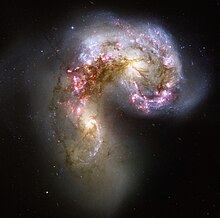NGC 4038 Group
| NGC 4038 Group | |
|---|---|
| Observation data (Epoch J2000) | |
| Constellation(s) | Corvus and Crater |
| Right ascension | [1][2] |
| Declination | [1][2] |
| Brightest member | Antennae Galaxies |
| Number of galaxies | 13-27[1][2][3][4] |
| Other designations | |
| LGG 263,[1] NOGG H 580,[2] NOGG P1 596,[2] NOGG P2 603[2] | |

The NGC 4038 Group is a group of galaxies in the constellations Corvus and Crater. The group may contain between 13 and 27 galaxies. The group's best known galaxies are the Antennae Galaxies (NGC 4038/NGC4039), a well-known interacting pair of galaxies.
Members
The table below lists galaxies that have been consistently identified as group members in the Nearby Galaxies Catalog,[3] the survey of Fouque et al.,[4] the Lyons Groups of Galaxies (LGG) Catalog,[1] and the three group lists created from the Nearby Optical Galaxy sample of Giuricin et al.[2]
| Name | Type[5] | R.A. (J2000)[5] | Dec. (J2000)[5] | Redshift (km/s)[5] | Apparent Magnitude[5] |
|---|---|---|---|---|---|
| Antennae Galaxies (NGC 4038/NGC 4039) | 12h 01m 53.3s | −18° 52′ 30″ | 1705 ± 5 | 13.0 | |
| NGC 3956 | SA(s)c | 11h 54m 00.7s | −20° 34′ 02″ | 1645 ± 5 | 13.1 |
| NGC 3957 | SA0 | 11h 54m 01.5s | −19° 34′ 08″ | 1637 ± 19 | 13.1 |
| NGC 3981 | SAB(s)bc pec | 11h 56m 07.5s | −19° 53′ 46″ | 1723 ± 4 | 12.1 |
| NGC 4024 | SB0 | 11h 58m 31.2s | −18° 20′ 49″ | 1694 ± 15 | 13.2 |
| NGC 4027 | SB(s)dm | 11h 59m 30.2s | −19° 15′ 55″ | 1671 ± 6 | 11.7 |
| NGC 4033 | E6 | 12h 00m 34.7s | −17° 50′ 33″ | 1617 ± 20 | 13.2 |
| NGC 4050 | SB(r)ab | 12h 02m 54.0s | −16° 22′ 25″ | 1761 ± 8 | 13.1 |
| PGC 37476 | SB(rs)c | 11h 55m 50.6s | −18° 11′ 47″ | 1596 ± 8 | 14.0 |
| PGC 38087 | SB(s)cd | 12h 03m 24.4s | −19° 31′ 21″ | 1664 ± 7 | 15.0 |
| UGCA 254 | SAB(s)cd | 11h 54m 49.5s | −16° 51′ 50″ | 1813 ± 6 | 14.5 |
| UGCA 257 | SB(s)m | 11h 58m 25.4s | −22° 26′ 24″ | 1795 ± 5 | 13.6 |
Additionally, the references above frequently but inconsistently identify PGC 37513, PGC 37565, and UGCA 270 as members of this group. Based on the above references, the exact membership of this group is somewhat uncertain as is the exact number of galaxies within the group.
Location
The NGC 4038 group along with other galaxies and galaxy groups[4] are part of the Crater Cloud[6][7] which is a component of the Virgo Supercluster.[6]
See also
- M96 Group - a similar group of galaxies
References
- ^ a b c d e A. Garcia (1993). "General study of group membership. II - Determination of nearby groups". Astronomy and Astrophysics Supplement. 100: 47–90. Bibcode:1993A&AS..100...47G.
- ^ a b c d e f g G. Giuricin; C. Marinoni; L. Ceriani; A. Pisani (2000). "Nearby Optical Galaxies: Selection of the Sample and Identification of Groups". Astrophysical Journal. 543 (1): 178–194. arXiv:astro-ph/0001140. Bibcode:2000ApJ...543..178G. doi:10.1086/317070. S2CID 9618325.
- ^ a b R. B. Tully (1988). Nearby Galaxies Catalog. Cambridge: Cambridge University Press. ISBN 0-521-35299-1.
- ^ a b c P. Fouque; E. Gourgoulhon; P. Chamaraux; G. Paturel (1992). "Groups of galaxies within 80 Mpc. II - The catalogue of groups and group members". Astronomy and Astrophysics Supplement. 93: 211–233. Bibcode:1992A&AS...93..211F.
- ^ a b c d e "NASA/IPAC Extragalactic Database". Results for various galaxies. Retrieved 2006-10-31.
- ^ a b Tully, R. B. (June 1982). "The Local Supercluster". The Astrophysical Journal. 257: 389–422. Bibcode:1982ApJ...257..389T. doi:10.1086/159999. ISSN 0004-637X.
- ^ Read, A. M.; Ponman, T. J.; Wolstencroft, R. D. (1995-11-15). "The X-ray properties of the merging galaxy pair NGC 4038/9 – the Antennae". Monthly Notices of the Royal Astronomical Society. 277 (2): 397–412. arXiv:astro-ph/9506047. Bibcode:1995MNRAS.277..397R. doi:10.1093/mnras/277.2.397. ISSN 0035-8711.
{{cite journal}}: CS1 maint: unflagged free DOI (link)
